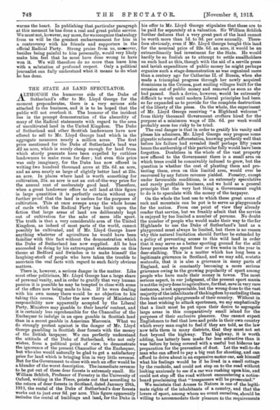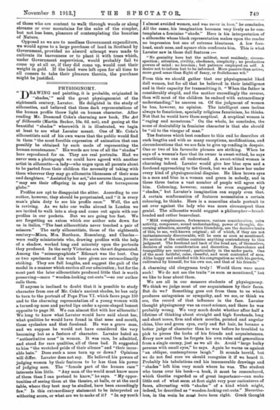THE STATE AS LAND SPECULATOR.
XTHOUGH the humorous side of the Duke of Sutherland's offer to Mr. Lloyd George for the moment preponderates, there is a very serious side attached to the business, and it is to be hoped that the public will not overlook it. The humour of the incident lies in the prompt demonstration of the absurdity of many of the Radical statements with regard to the area of uncultivated land in the 'United Kingdom. The Duke of Sutherland and other Scottish landowners have now offered to sell to Mr. Lloyd George land which in the aggregate measures nearly a million acres. The first price mentioned for the Duke of Sutherland's land was £2 an acre, which is surely cheap enough for land from which sturdy peasants have been expelled by ruthless landowners to make room for deer ; but even this price was only imaginary, for the Duke has now offered in writing two hundred thousand acres at 22s. 6d. an acre, and an area nearly as large of slightly better land at 25s. an acre. In places where land is worth something for cultivation, 25s. an acre is not an out-of-the-way price for the annual rent of moderately good land. Therefore, when a great landowner offers to sell land at this figure in large quantities it is perfectly certain without any further proof that the land is useless for the purposes of cultivation. This at once sweeps away the whole house of cards which the Radical Party has built upon the fiction that large areas of land are deliberately kept out of cultivation for the sake of mere idle sport. The truth is that a very considerable area of the -United Kingdom, as indeed of most parts of the world, cannot possibly be cultivated, and if Mr. Lloyd George knew anything whatever of agriculture be would have been familiar with this fact without the demonstration which the Duke of Sutherland has now supplied. All he has succeeded in doing by his extravagant statements on this theme at Bedford and Swindon is to make himself the laughing-stock of people who have taken the trouble to ascertain the real facts with regard to such fairly obvious matters. There is, however, a serious danger in the matter. Like most other politicians, Mr. Lloyd George has a large share of personal vanity, and in order to gratify that very human passion it is possible he may be tempted to close with some of the offers now being made to him. If be were dealing with his own money there would be no objection to his taking this course. -Under the new theory of Ministerial responsibility now apparently accepted by the Liberal Party, Ministers may gamble to their hearts' content, and it is certainly less reprehensible for the Chancellor of the Exchequer to indulge in an open gamble in Scottish land than in a secret gamble in American Marconis. What we do strongly protest against is the danger of Mr. Lloyd George gambling in Scottish deer forests with the money of the British taxpayer. We can perfectly understand the attitude of the Duke of Sutherland, who not only wishes, from a political point of view, to demonstrate the ignorance of the present Chancellor of the Exchequer, but who also would naturally be glad to get a satisfactory price for land which is bringing him in very little revenue. But for the Government to close with such an offer would be a blunder of the worst description. The immediate revenue to be got out of these deer forests is extremely small. Sir William Schlich, Professor of Forestry in the University of Oxford, writing in the Times, points out that according to the return of deer forests in Scotland, dated January 29th, 1913, the rental of the Duke of Sutherland's deer forests works out to just over 8d. per acre. This figure apparently includes the rental of buildings and land, for the Duke in
his offer to Mr. Lloyd George stipulates that these are to be paid for separately at a valuation. Sir William Schlich further deduces that a very great part of the land cannot be worth more than id. to 3d. per acre annually. • Therefore obviously, even if Mr. Lloyd George bought this land for the nominal price of 22s. 6d. an acre, it would be an extraordinarily bad investment for the State. He would hardly be so foolish as to attempt to settle smallholders on such laud as this, though with the aid of a servile press and lavish expenditure of public money he might perhaps organize such a stage demonstration as was organized more than a century ago for Catherine II. of Russia, when she made a triumphal progress through her newly acquired dominions in the Crimea, past smiling villages built for the occasion out of public money and removed as soon as she had passed. Such a device, however, would be extremely difficult to work until modern Liberal principles had been so far expanded as to provide for the complete destruction of the liberty of the press. On the whole, the experiment of Mr. Lloyd George receiving " a Highland welcome" from thirty thousand Government crofters hired for the purpose at a minimum wage of 22s. 6d. per week would. probably seem too risky to be tried.
The real danger is that in order to gratify his vanity and please his admirers, Mr. Lloyd George may propose some gigantic scheme of afforestation, knowing perfectly well that before his failure had revealed itself perhaps fifty years hence the authorship of this particular folly would have been forgotten. Doubtless in the whole of the vast property now offered to the Government there is a small area on which trees could be conceivably induced to grow, but the question is whether the cost of planting them and protecting them, even on this limited area, would ever be recovered by any future revenue yielded. Forestry, except under favourable conditions, is an extremely speculative and rarely profitable business, and we hold as a general principle that the very last thing a Government ought to do is to speculate with the money of the taxpayer. On the whole the best use to which these great areas of rock and mountain can be put is to serve as playgrounds for the nation. From one point of view they already render that service, but we frankly admit that the service is enjoyed by too limited a number of persons. No doubt the number of people who would make their way to the far Highlands to use the Duke of Sutherland's land as a playground must always be limited, but there is no reason why this natural limitation should further be extended by a policy of preventing access to this wild land in order that it may serve as a better sporting ground for the still fewer persons who spend four or five weeks in the year in deer-stalking. This is a matter which has long been a legitimate grievance in Scotland, and we may add, mutatis mutandis, that it is also a grievance in many parts of England, and is constantly becoming a more serious grievance owing to the growing popularity of sport among people who have made their money in towns. The most serious aspect, in our judgment, of the present sport mania is not the injury done to agriculture, for that, save in very rare instances, is not appreciable, but the wrong done to the vast majority of the inhabitants of thekingdom by excluding them from the natural playgrounds of their country. Without in the least wishing to attack sportsmen, we say emphatically that a limit must be put upon their desire to segregate large areas in this comparatively small island for the purposes of their exclusive pleasure. One cannot expect Englishmen to feel that love and pride in their own country which every man ought to feel if they are told, as the law now tells them in many districts, that they must not set foot beyond the highway. That highway, it is worth adding, has latterly been made far less attractive than it was before by being covered with a useful but hideous tar preparation for the prevention of dust. Let the well-to-do man who can afford to pay a big rent for shooting, and can afford to drive about in an expensive motor-car, ask himself what his feelings would be if he lived in a small cottage by the roadside, and could not step on to the road without
looking anxiously to see if a car was rushing upon him, and could not step off the road without encountering a noticeboard proclaiming that "trespassers will be prosecuted." We maintain that Access to Nature is one of the legitimate rights of the inhabitants of a country, and that the lovers of sport, among whom we count ourselves, should be willing to accommodate their pleasure to the requirements
of those who are content to walk through woods or along streams or over mountains for the sake of the simpler, but not less keen, pleasure of contemplating the beauties of Nature.
Opposed as we are to needless Government expenditure, we would agree to a large purchase of land in Scotland by Government, provided no absurd attempt were made to cultivate its barrenness or to plant it with trees which, under Government supervision, would probably fail to come up at all or, if they did come up, would cost their weight in gold. If the land were left open for all time to all comers to take their pleasure therein, the purchase might be justified.



















































 Previous page
Previous page